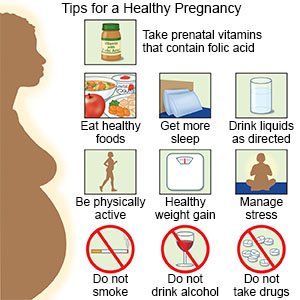Obesity in Pregnancy
Medically reviewed by Drugs.com. Last updated on Aug 4, 2025.
Obesity may make it harder for you to get pregnant. You may also have trouble getting pregnant if you choose to have in vitro fertility treatments to get pregnant. When you get pregnant, your risk for health problems during pregnancy is higher if you have obesity. Your baby would also have an increased risk for certain health problems.
DISCHARGE INSTRUCTIONS:
What you need to know before you get pregnant:
You can lower your risk for health problems during pregnancy by doing the following:
- Lose weight. Your healthcare provider can help you lose weight safely. Your provider or a dietitian can also help you develop a healthy meal plan to help you lose weight. Ask your provider how much weight you should lose before you get pregnant.
- Exercise regularly. Exercise can help you lose weight and it can help to improve your health. Ask about the best exercise plan for you.

- Take folic acid supplements. Folic acid is a B vitamin that helps to lower the risk for certain birth defects, such as spina bifida. You need to have enough folic acid in your body before and during your pregnancy to decrease this risk. Birth defects can happen in the early part of pregnancy when you may not know that you are pregnant. You may need 400 to 800 mcg of folic acid each day.

How obesity can affect your pregnancy:
Obesity can increase your risk of the following health problems:
- High blood pressure and preeclampsia (high blood pressure and problems with kidneys and other organs)
- Gestational diabetes
- Infections during pregnancy such as urinary tract infections
- Longer labor
- Cesarean birth (c-section) and problems with anesthesia during a c-section
- Problems after a c-section such as infection, losing too much blood, or blood clots
Related medications
Treatment options
The following list of medications are related to or used in the treatment of this condition.
How obesity can affect your baby:
Obesity can increase your baby's risk of the following health problems:
- Birth defects such as heart defects and neural tube defects (defects of the brain and spine) such as spina bifida
- Large baby (more than 9 pounds 15 ounces), which may increase the risk of injury during delivery
- Premature birth
- Miscarriage (loss of fetus before 20 weeks of pregnancy)
- Stillbirth (a fetus that shows no signs of life after 20 weeks of pregnancy)
- Health problems later in life such as diabetes, heart disease, and obesity
What you can do to have a healthy pregnancy:
 |
- See your healthcare provider or obstetrician regularly for prenatal care. Your healthcare provider will examine you and do tests to check your and your baby's health throughout your pregnancy.
- Do not diet or try to lose weight during pregnancy. You need extra calories and nutrients during pregnancy. Eat a variety of healthy foods and take prenatal vitamins as directed to get the nutrients you need. Work with your healthcare provider or dietitian to develop a healthy meal plan that is right for you.
- Ask your healthcare provider how much weight you should gain during your pregnancy. Your provider may recommend that you gain 11 to 20 pounds.
- Exercise at a safe level throughout your pregnancy. Ask your provider which kinds of physical activities are right for you. Your provider may recommend walking or swimming. If you have not exercised before, you may need to start slowly and then increase the amount over time.

Follow up with your doctor or obstetrician as directed:
You may be referred to a behavioral counselor to develop healthy nutrition and exercise plans for you. Write down your questions so you remember to ask them during your visits.
© Copyright Merative 2025 Information is for End User's use only and may not be sold, redistributed or otherwise used for commercial purposes.
The above information is an educational aid only. It is not intended as medical advice for individual conditions or treatments. Talk to your doctor, nurse or pharmacist before following any medical regimen to see if it is safe and effective for you.
Learn more about Obesity
- Can You Mix Weight Loss Drugs and Alcohol?
- FDA-Approved Weight Loss Drugs: Can They Help You?
- Side Effects of Weight Loss Drugs
- Top 10 Diabetes Treatments You May Have Missed
- Weight Loss Drugs & Injections: What Are Your Options?
- Which Drugs Cause Weight Gain?
Treatment options
Care guides
Further information
Always consult your healthcare provider to ensure the information displayed on this page applies to your personal circumstances.
